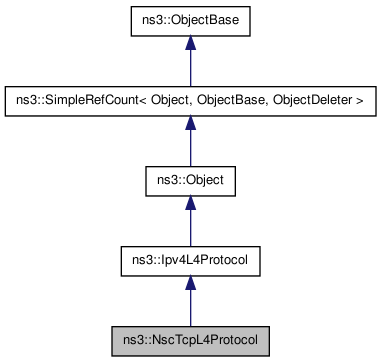Nsc wrapper glue, to interface with the Ipv4 protocol underneath. More...
#include <nsc-tcp-l4-protocol.h>


Public Member Functions | |
| NscTcpL4Protocol () | |
| Constructor. | |
| void | SetNode (Ptr< Node > node) |
| void | SetNscLibrary (const std::string &lib) |
| std::string | GetNscLibrary (void) const |
| virtual int | GetProtocolNumber (void) const |
| virtual int | GetVersion (void) const |
| Ptr< Socket > | CreateSocket (void) |
| Ipv4EndPoint * | Allocate (void) |
| Ipv4EndPoint * | Allocate (Ipv4Address address) |
| Ipv4EndPoint * | Allocate (uint16_t port) |
| Ipv4EndPoint * | Allocate (Ipv4Address address, uint16_t port) |
| Ipv4EndPoint * | Allocate (Ipv4Address localAddress, uint16_t localPort, Ipv4Address peerAddress, uint16_t peerPort) |
| void | DeAllocate (Ipv4EndPoint *endPoint) |
| virtual Ipv4L4Protocol::RxStatus | Receive (Ptr< Packet > p, Ipv4Header const &header, Ptr< Ipv4Interface > incomingInterface) |
| Receive a packet up the protocol stack. | |
Static Public Member Functions | |
| static TypeId | GetTypeId (void) |
| This method returns the TypeId associated to ns3::NscTcpL4Protocol. | |
Static Public Attributes | |
| static const uint8_t | PROT_NUMBER |
Protected Member Functions | |
| virtual void | DoDispose (void) |
| virtual void | NotifyNewAggregate () |
Friends | |
| class | NscInterfaceImpl |
| class | NscTcpSocketImpl |
Detailed Description
Nsc wrapper glue, to interface with the Ipv4 protocol underneath.
Member Function Documentation
- Returns:
- A smart Socket pointer to a NscTcpSocketImpl, allocated by this instance of the TCP protocol
| virtual void ns3::NscTcpL4Protocol::DoDispose | ( | void | ) | [protected, virtual] |
This method is called by Object::Dispose or by the object's destructor, whichever comes first.
Subclasses are expected to implement their real destruction code in an overriden version of this method and chain up to their parent's implementation once they are done. i.e., for simplicity, the destructor of every subclass should be empty and its content should be moved to the associated DoDispose method.
It is safe to call GetObject from within this method.
Reimplemented from ns3::Object.
| virtual int ns3::NscTcpL4Protocol::GetProtocolNumber | ( | void | ) | const [virtual] |
- Returns:
- the protocol number of this protocol.
Implements ns3::Ipv4L4Protocol.
| static TypeId ns3::NscTcpL4Protocol::GetTypeId | ( | void | ) | [static] |
This method returns the TypeId associated to ns3::NscTcpL4Protocol.
This object is accessible through the following paths with Config::Set and Config::Connect:
- /NodeList/[i]/DeviceList/[i]/$ns3::AlohaNoackNetDevice/Phy/$ns3::Ipv4L4Protocol/$ns3::NscTcpL4Protocol
- /NodeList/[i]/DeviceList/[i]/$ns3::AlohaNoackNetDevice/Phy/$ns3::NscTcpL4Protocol
- /NodeList/[i]/DeviceList/[i]/$ns3::BaseStationNetDevice/BsIpcsPacketClassifier/$ns3::Ipv4L4Protocol/$ns3::NscTcpL4Protocol
- /NodeList/[i]/DeviceList/[i]/$ns3::BaseStationNetDevice/BsIpcsPacketClassifier/$ns3::NscTcpL4Protocol
- /NodeList/[i]/DeviceList/[i]/$ns3::BaseStationNetDevice/LinkManager/$ns3::Ipv4L4Protocol/$ns3::NscTcpL4Protocol
- /NodeList/[i]/DeviceList/[i]/$ns3::BaseStationNetDevice/LinkManager/$ns3::NscTcpL4Protocol
- /NodeList/[i]/DeviceList/[i]/$ns3::BaseStationNetDevice/SSManager/$ns3::Ipv4L4Protocol/$ns3::NscTcpL4Protocol
- /NodeList/[i]/DeviceList/[i]/$ns3::BaseStationNetDevice/SSManager/$ns3::NscTcpL4Protocol
- /NodeList/[i]/DeviceList/[i]/$ns3::BaseStationNetDevice/ServiceFlowManager/$ns3::Ipv4L4Protocol/$ns3::NscTcpL4Protocol
- /NodeList/[i]/DeviceList/[i]/$ns3::BaseStationNetDevice/ServiceFlowManager/$ns3::NscTcpL4Protocol
- /NodeList/[i]/DeviceList/[i]/$ns3::NonCommunicatingNetDevice/Phy/$ns3::Ipv4L4Protocol/$ns3::NscTcpL4Protocol
- /NodeList/[i]/DeviceList/[i]/$ns3::NonCommunicatingNetDevice/Phy/$ns3::NscTcpL4Protocol
- /NodeList/[i]/DeviceList/[i]/$ns3::SubscriberStationNetDevice/Classifier/$ns3::Ipv4L4Protocol/$ns3::NscTcpL4Protocol
- /NodeList/[i]/DeviceList/[i]/$ns3::SubscriberStationNetDevice/Classifier/$ns3::NscTcpL4Protocol
- /NodeList/[i]/DeviceList/[i]/$ns3::SubscriberStationNetDevice/LinkManager/$ns3::Ipv4L4Protocol/$ns3::NscTcpL4Protocol
- /NodeList/[i]/DeviceList/[i]/$ns3::SubscriberStationNetDevice/LinkManager/$ns3::NscTcpL4Protocol
- /NodeList/[i]/DeviceList/[i]/$ns3::SubscriberStationNetDevice/SSScheduler/$ns3::Ipv4L4Protocol/$ns3::NscTcpL4Protocol
- /NodeList/[i]/DeviceList/[i]/$ns3::SubscriberStationNetDevice/SSScheduler/$ns3::NscTcpL4Protocol
- /NodeList/[i]/DeviceList/[i]/$ns3::UanNetDevice/Channel/NoiseModel/$ns3::Ipv4L4Protocol/$ns3::NscTcpL4Protocol
- /NodeList/[i]/DeviceList/[i]/$ns3::UanNetDevice/Channel/NoiseModel/$ns3::NscTcpL4Protocol
- /NodeList/[i]/DeviceList/[i]/$ns3::UanNetDevice/Channel/PropagationModel/$ns3::Ipv4L4Protocol/$ns3::NscTcpL4Protocol
- /NodeList/[i]/DeviceList/[i]/$ns3::UanNetDevice/Channel/PropagationModel/$ns3::NscTcpL4Protocol
- /NodeList/[i]/DeviceList/[i]/$ns3::UanNetDevice/Mac/$ns3::Ipv4L4Protocol/$ns3::NscTcpL4Protocol
- /NodeList/[i]/DeviceList/[i]/$ns3::UanNetDevice/Mac/$ns3::NscTcpL4Protocol
- /NodeList/[i]/DeviceList/[i]/$ns3::UanNetDevice/Phy/$ns3::Ipv4L4Protocol/$ns3::NscTcpL4Protocol
- /NodeList/[i]/DeviceList/[i]/$ns3::UanNetDevice/Phy/$ns3::NscTcpL4Protocol
- /NodeList/[i]/DeviceList/[i]/$ns3::UanNetDevice/Transducer/$ns3::Ipv4L4Protocol/$ns3::NscTcpL4Protocol
- /NodeList/[i]/DeviceList/[i]/$ns3::UanNetDevice/Transducer/$ns3::NscTcpL4Protocol
- /NodeList/[i]/DeviceList/[i]/$ns3::WimaxNetDevice/$ns3::BaseStationNetDevice/BsIpcsPacketClassifier/$ns3::Ipv4L4Protocol/$ns3::NscTcpL4Protocol
- /NodeList/[i]/DeviceList/[i]/$ns3::WimaxNetDevice/$ns3::BaseStationNetDevice/BsIpcsPacketClassifier/$ns3::NscTcpL4Protocol
- /NodeList/[i]/DeviceList/[i]/$ns3::WimaxNetDevice/$ns3::BaseStationNetDevice/LinkManager/$ns3::Ipv4L4Protocol/$ns3::NscTcpL4Protocol
- /NodeList/[i]/DeviceList/[i]/$ns3::WimaxNetDevice/$ns3::BaseStationNetDevice/LinkManager/$ns3::NscTcpL4Protocol
- /NodeList/[i]/DeviceList/[i]/$ns3::WimaxNetDevice/$ns3::BaseStationNetDevice/SSManager/$ns3::Ipv4L4Protocol/$ns3::NscTcpL4Protocol
- /NodeList/[i]/DeviceList/[i]/$ns3::WimaxNetDevice/$ns3::BaseStationNetDevice/SSManager/$ns3::NscTcpL4Protocol
- /NodeList/[i]/DeviceList/[i]/$ns3::WimaxNetDevice/$ns3::BaseStationNetDevice/ServiceFlowManager/$ns3::Ipv4L4Protocol/$ns3::NscTcpL4Protocol
- /NodeList/[i]/DeviceList/[i]/$ns3::WimaxNetDevice/$ns3::BaseStationNetDevice/ServiceFlowManager/$ns3::NscTcpL4Protocol
- /NodeList/[i]/DeviceList/[i]/$ns3::WimaxNetDevice/$ns3::SubscriberStationNetDevice/Classifier/$ns3::Ipv4L4Protocol/$ns3::NscTcpL4Protocol
- /NodeList/[i]/DeviceList/[i]/$ns3::WimaxNetDevice/$ns3::SubscriberStationNetDevice/Classifier/$ns3::NscTcpL4Protocol
- /NodeList/[i]/DeviceList/[i]/$ns3::WimaxNetDevice/$ns3::SubscriberStationNetDevice/LinkManager/$ns3::Ipv4L4Protocol/$ns3::NscTcpL4Protocol
- /NodeList/[i]/DeviceList/[i]/$ns3::WimaxNetDevice/$ns3::SubscriberStationNetDevice/LinkManager/$ns3::NscTcpL4Protocol
- /NodeList/[i]/DeviceList/[i]/$ns3::WimaxNetDevice/$ns3::SubscriberStationNetDevice/SSScheduler/$ns3::Ipv4L4Protocol/$ns3::NscTcpL4Protocol
- /NodeList/[i]/DeviceList/[i]/$ns3::WimaxNetDevice/$ns3::SubscriberStationNetDevice/SSScheduler/$ns3::NscTcpL4Protocol
- /NodeList/[i]/DeviceList/[i]/$ns3::WimaxNetDevice/BandwidthManager/$ns3::Ipv4L4Protocol/$ns3::NscTcpL4Protocol
- /NodeList/[i]/DeviceList/[i]/$ns3::WimaxNetDevice/BandwidthManager/$ns3::NscTcpL4Protocol
- /NodeList/[i]/DeviceList/[i]/$ns3::WimaxNetDevice/BurstProfileManager/$ns3::Ipv4L4Protocol/$ns3::NscTcpL4Protocol
- /NodeList/[i]/DeviceList/[i]/$ns3::WimaxNetDevice/BurstProfileManager/$ns3::NscTcpL4Protocol
- /NodeList/[i]/DeviceList/[i]/$ns3::WimaxNetDevice/Channel/$ns3::UanChannel/NoiseModel/$ns3::Ipv4L4Protocol/$ns3::NscTcpL4Protocol
- /NodeList/[i]/DeviceList/[i]/$ns3::WimaxNetDevice/Channel/$ns3::UanChannel/NoiseModel/$ns3::NscTcpL4Protocol
- /NodeList/[i]/DeviceList/[i]/$ns3::WimaxNetDevice/Channel/$ns3::UanChannel/PropagationModel/$ns3::Ipv4L4Protocol/$ns3::NscTcpL4Protocol
- /NodeList/[i]/DeviceList/[i]/$ns3::WimaxNetDevice/Channel/$ns3::UanChannel/PropagationModel/$ns3::NscTcpL4Protocol
- /NodeList/[i]/DeviceList/[i]/$ns3::WimaxNetDevice/ConnectionManager/$ns3::Ipv4L4Protocol/$ns3::NscTcpL4Protocol
- /NodeList/[i]/DeviceList/[i]/$ns3::WimaxNetDevice/ConnectionManager/$ns3::NscTcpL4Protocol
- /NodeList/[i]/DeviceList/[i]/$ns3::WimaxNetDevice/Phy/Channel/$ns3::UanChannel/NoiseModel/$ns3::Ipv4L4Protocol/$ns3::NscTcpL4Protocol
- /NodeList/[i]/DeviceList/[i]/$ns3::WimaxNetDevice/Phy/Channel/$ns3::UanChannel/NoiseModel/$ns3::NscTcpL4Protocol
- /NodeList/[i]/DeviceList/[i]/$ns3::WimaxNetDevice/Phy/Channel/$ns3::UanChannel/PropagationModel/$ns3::Ipv4L4Protocol/$ns3::NscTcpL4Protocol
- /NodeList/[i]/DeviceList/[i]/$ns3::WimaxNetDevice/Phy/Channel/$ns3::UanChannel/PropagationModel/$ns3::NscTcpL4Protocol
Attributes defined for this type:
-
SocketList: The list of sockets associated to this protocol.
- Set with class: ns3::ObjectVectorValue
- Underlying type: ns3::Ptr< ns3::NscTcpSocketImpl >
- Flags: read
-
Library: Set the linux library to be used to create the stack
- Set with class: StringValue
- Underlying type: std::string
- Initial value: liblinux2.6.26.so
- Flags: construct read
Attributes defined in parent class ns3::Ipv4L4Protocol:
-
ProtocolNumber: The Ipv4 protocol number.
- Set with class: ns3::UintegerValue
- Underlying type: int32_t 18446744071562067968:2147483647
- Flags: read
No TraceSources defined for this type.
Reimplemented from ns3::Ipv4L4Protocol.
| virtual void ns3::NscTcpL4Protocol::NotifyNewAggregate | ( | ) | [protected, virtual] |
This method is invoked whenever two sets of objects are aggregated together. It is invoked exactly once for each object in both sets. This method can be overriden by subclasses who wish to be notified of aggregation events. These subclasses must chain up to their base class NotifyNewAggregate method. It is safe to call GetObject and AggregateObject from within this method.
Reimplemented from ns3::Object.
| virtual Ipv4L4Protocol::RxStatus ns3::NscTcpL4Protocol::Receive | ( | Ptr< Packet > | p, | |
| Ipv4Header const & | header, | |||
| Ptr< Ipv4Interface > | incomingInterface | |||
| ) | [virtual] |
Receive a packet up the protocol stack.
- Parameters:
-
p The Packet to dump the contents into header IPv4 Header information incomingInterface The Ipv4Interface it was received on
Implements ns3::Ipv4L4Protocol.
The documentation for this class was generated from the following files:
- src/internet-stack/nsc-tcp-l4-protocol.h
- doc/introspected-doxygen.h
 1.7.1
1.7.1